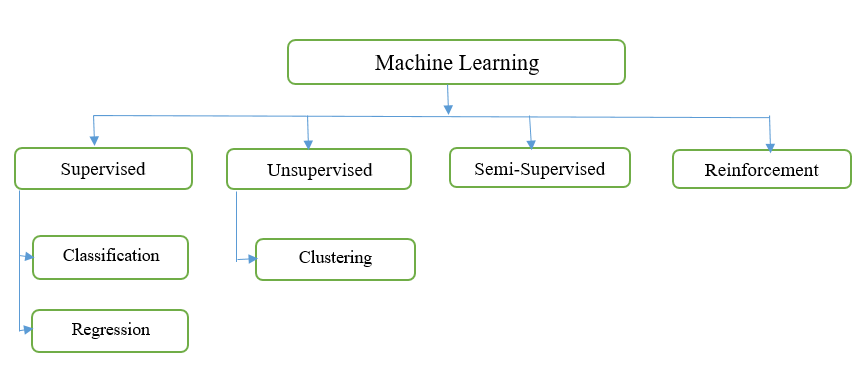Tuberculosis Prediction by Machine Learning Techniques
Main Article Content
Abstract
Tuberculosis is one of the top reasons of death all over the planet. Mycobacterium tuberculosis, bacteria that infects the lungs, is what causes it. For professionals working in the medical field, accurately identifying and timely predicting tuberculosis are major challenges. The course of treatment also varies from patient to patient since occasionally a patient develops drug resistance. Doctors will be given algorithmic support while using machine learning to help them diagnose, treat patients appropriately, and make quicker and better judgments. This paper discusses the many tuberculosis causes and symptoms as well as how accurate and fast prediction and diagnostic investigations have been carried out in recent years with the aid of machine learning (ML) techniques
Article Details
References
Global Tuberculosis Report 2018.
Fogel, Nicole. "Tuberculosis: a disease without boundaries." Tuberculosis 95.5 (2015): 527-531.
Kalhori, Sharareh R. Niakan, and Xiao-Jun Zeng. "Evaluation and comparison of different machine learning methods to predict the outcome of the tuberculosis treatment course." Journal of Intelligent Learning Systems and Applications 5.03 (2013): 184
Dande, Payal, and Purva Samant. "Acquaintance to artificial neural networks and use of artificial intelligence as a diagnostic tool for tuberculosis: a review." Tuberculosis (2017).
Niehaus, Katherine E., et al. "Machine learning for the prediction of antibacterial susceptibility in Mycobacterium tuberculosis." Biomedical and Health Informatics (BHI), 2014 IEEE-EMBS International Conference on. IEEE, 2014.
Doshi, Riddhi, et al. "Tuberculosis control, and the where and why of artificial intelligence." ERJ open research 3.2 (2017): 00056-2017.
Uçar, Tamer, and Adem Karahoca. "Predicting existence of Mycobacterium tuberculosis on patients using data mining approaches." Procedia Computer Science 3 (2011): 1404-1411.
Shamshirband, Shahaboddin, et al. "Tuberculosis disease diagnosis using artificial immune recognition system." International journal of medical sciences 11.5 (2014): 508.
Yang, Yang, et al. "Machine learning for classifying tuberculosis drug-resistance from DNA sequencing data." Bioinformatics 34.10 (2017): 1666-1671
Ashadevi, B., P. Muthamil Selvi, and B. Sasi Revathi. "An Effective Diagnosis of Pulmonary Tuberculosis using K-Means Clustering and ANFIS."(2017)
Ashwini, D. V., and S. Seema. "Machine Learning Approach to Detect Tuberculosis in patients with or without HIV co-infection-A Survey."(2015)
Chen, Michael L., et al. "Deep Learning Predicts Tuberculosis Drug Resistance Status from Whole-Genome Sequencing Data." bioRxiv (2018): 275628.
Yahiaoui, Amani, Orhan Er, and Nejat Yumusak. "A new method of automatic recognition for tuberculosis disease diagnosis using support vector machines." Biomedical Research 28.9 (2017).
Wu, Xindong, et al. "Top 10 algorithms in data mining." Knowledge and information systems 14.1 (2008): 1-37.
Kesavaraj, Gopalan, and Sreekumar Sukumaran. "A study on classification techniques in data mining." Computing, Communications and Networking Technologies (ICCCNT), 2013 Fourth International Conference on. IEEE, 2013.
World Health Organization. (2018) Tuberculosis: Fact sheet. [Online]. Available: http://www.who.int/news-room/fact-sheets/detail/tuberculosis
Omisore, Mumini Olatunji, Oluwarotimi Williams Samuel, and Edafe John Atajeromavwo. "A Genetic-Neuro-Fuzzy inferential model for diagnosis of tuberculosis." Applied Computing and Informatics 13.1 (2017): 27-37.
Godara, Sunila, and Rishipal Singh. "Evaluation of predictive machine learning techniques as expert systems in medical diagnosis." Indian Journal of Science and Technology 9.10 (2016).
Amato, Filippo, et al. "Artificial neural networks in medical diagnosis." (2013): 47-58.
Lakhani, Paras, and Baskaran Sundaram. "Deep learning at chest radiography: automated classification of pulmonary tuberculosis by using convolutional neural networks." Radiology 284.2 (2017): 574-582.
Chen, Min, et al. "Disease prediction by machine learning over big data from healthcare communities." IEEE Access 5 (2017): 8869-8879.
Cao, Yu, et al. "Improving tuberculosis diagnostics using deep learning and mobile health technologies among resource-poor and marginalized communities." 2016 IEEE First International Conference on Connected Health: Applications, Systems and Engineering Technologies (CHASE). IEEE, 2016.
Alcantara, Marlon F., et al. "Improving tuberculosis diagnostics using deep learning and mobile health technologies among resource-poor communities in Peru." Smart Health 1 (2017): 66-76.
Er, Orhan, Feyzullah Temurtas, and A. Çetin Tanr?kulu. "Tuberculosis disease diagnosis using artificial neural networks." Journal of medical systems 34.3 (2010): 299-302.
Elveren, Erhan, and Nejat Yumu?ak. "Tuberculosis disease diagnosis using an artificial neural network trained with genetic algorithm." Journal of medical systems 35.3 (2011): 329-332.
Maji, Srabanti, and Srishti Arora. "Decision Tree Algorithms for Prediction of Heart Disease." Information and Communication Technology for Competitive Strategies. Springer, Singapore, 2019. 447-454. (2018)
Zakaria, Magdi, AL-Shebany Mabrouka, and Shahenda Sarhan. "Artificial neural network: a brief overview." neural networks 1: 2. (2014)
Fatima, Meherwar, and Maruf Pasha. "Survey of machine learning algorithms for disease diagnostic." Journal of Intelligent Learning Systems and Applications 9.01 (2017): 1.
Kavakiotis, Ioannis, et al. "Machine learning and data mining methods in diabetes research." Computational and structural biotechnology journal 15 (2017): 104-116.
Jain, Divya, and Vijendra Singh. "Feature selection and classification systems for chronic disease prediction: A review." Egyptian Informatics Journal (2018).

